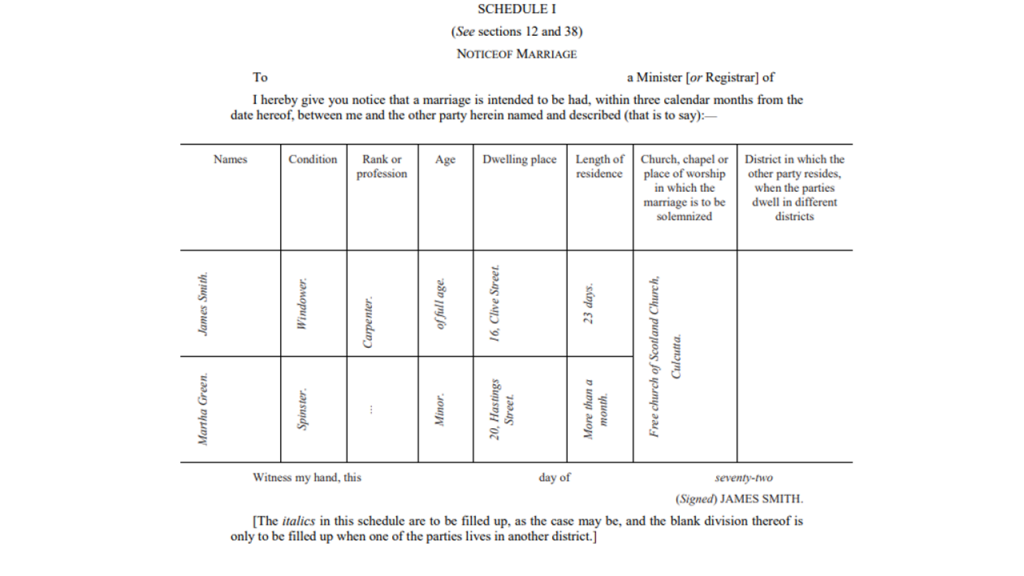A marriage performed by a Marriage Registrar is divided into 4 stages:
Stage 1: Issuing of Preliminary Notice
If a couple wishes to be married by a Marriage Registrar, one of them must give a notice in person to the Registrar of the district in which the couple lives. In case they live in different districts, the notice shall be given to the Registrars of both the districts. The notice shall state their intention to be married, in the prescribed format, and should mention the following:
- The name and surname, and the profession, of each of the persons intending marriage,
- The current address of each of them,
- The time during which each has been present in the said address. In case a person has been staying there for more than a month, they only need to state the same.
- The place where the marriage will take place.(( Section 38, Indian Christian Marriage Act, 1872.))
Given below is a sample notice:

The notice will be pasted by the Registrar at a conspicuous place in the office,(( Section 39, Indian Christian Marriage Act, 1872.)) and will be entered in the Marriage Notice Book kept in the office.
Stage 2: Issuing of certificate of receipt of notice
After at least four days of receiving the notice by the Registrar,(( Section 41, Indian Christian Marriage Act, 1872.)) one of the parties intending marriage must make an oath to the Registrar, stating that there are no legal problems in performing the marriage, and that they live within the District of the Registrar’s office.(( Section 42, Indian Christian Marriage Act, 1872.)) In case one of the parties is a minor, one of the parties must also take an oath stating that the necessary steps have been taken.(( Section 42, Indian Christian Marriage Act, 1872.)) To know more about the special procedures of marriage of a minor, read our explainer on Marriages of Minors under Christian Law.
After such a declaration has been made, the Registrar will issue a certificate to the parties, in the prescribed format, and the parties can be married by any Registrar or in the Registrar’s presence, within two months of receiving the certificate.(( Sections 41, 50-52, Indian Christian Marriage Act, 1872.)) Given below is a sample of a certificate of receipt of notice.
Stage 3: Performance of Marriage
The certificates obtained must be produced in front of the Registrar at the time of marriage.(( Section 51, Indian Christian Marriage Act, 1872.)) The marriage will be conducted either by the Registrar themselves, or any other person authorized to do the same. The marriage ceremony must be attended by two witnesses, apart from the Registrar.(( Section 51, Indian Christian Marriage Act, 1872.)) In case two months have passed from receipt of the certificate, the entire process must restart with a fresh notice.(( Section 52, Indian Christian Marriage Act, 1872.))
Stage 4: Registration of Marriage
After the performance of the marriage, the details of the marriage shall be entered in a register by the Registrar, in the prescribed format.(( Sections 53 & 54, Indian Christian Marriage Act, 1872.)) The entry will be signed by the Registrar, the person who performed the marriage (if marriage was performed by someone other than the Registrar), parties to the marriage, and two witnesses who had attended the ceremony.(( Section 54, Indian Christian Marriage Act, 1872.))
A certified copy of an entry in the marriage register, signed by the person under whose custody the register is kept, will act as evidence that the persons mentioned in the entry have been married according to the law.(( Section 80, Indian Christian Marriage Act, 1872.)) Upon payment of the prescribed fees to the Marriage Registrar, one can always inspect a marriage register which is within the custody of the said Registrar.(( Section 79, Indian Christian Marriage Act, 1872.))
